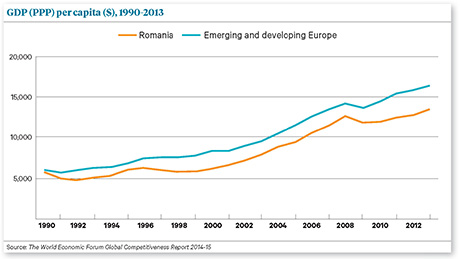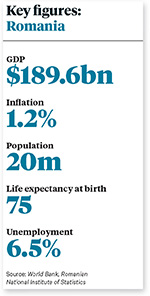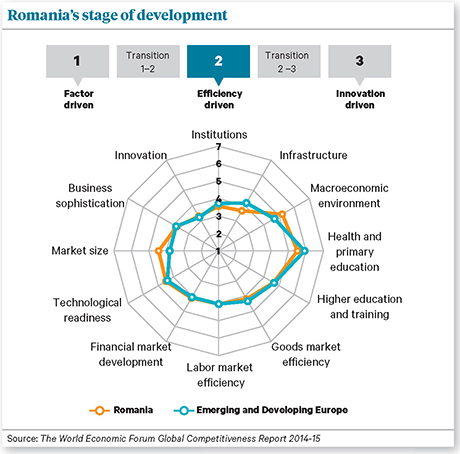- About Us
-
Expertise
- Banking & Finance
- Capital Markets
- Competition & Antitrust
- Corporate & Commercial
- Data Privacy
- Employment & Pensions
- Energy & Natural Resources
- Gambling & Betting
- Healthcare & Pharmaceuticals
- Insurance
- Intellectual Property
- International Arbitration
- Litigation
- Mergers & Acquisitions
- Project Finance/PPP, Concessions & Infrastructure
- Public Procurement
- Real Estate
- Restructuring & Insolvency
- Sports Law
- Tax
- Telecommunications, Media & Technology
- Transports & Logistics
- White Collar Compliance & Defense
- Our team
- Careers
- Publications
- News and Press
- Contact
Press Reviews
Optimism flows deep
The discovery of new oil deposits in the Black Sea holds promise of a new golden age for Romania’s energy industry – and for the local law firms

In brief
Romania’s energy industry could soon be hitting a high. Earlier this year, the country discovered new oil reserves in the Black Sea that have the potential to reinvigorate its local energy sector and have wider repercussions for Europe by offering a pipeline free of the dependence on Russia.
The development could not have come at a more fortuitous time. The country’s current oil reserves are winding down, which means that this new deposit will be heavily relied on in future to boost the country’s potential as an energy hub in Eastern Europe.
Historically Romania’s energy market was nationalised but it is now mostly in private hands. However, local investors play only a small part.
 “We have a significant presence of local entrepreneurs in the energy market, but on a smaller scale,” Popovici Nitu & Asociatii managing partner Florian Nitu says. “In the green sector there are a lot of attempts by local investors to enter the market but energy is an unequal playing field. The local economy is not that developed for entrepreneurs to be able to reach the scale of outside players.”
“We have a significant presence of local entrepreneurs in the energy market, but on a smaller scale,” Popovici Nitu & Asociatii managing partner Florian Nitu says. “In the green sector there are a lot of attempts by local investors to enter the market but energy is an unequal playing field. The local economy is not that developed for entrepreneurs to be able to reach the scale of outside players.”
European investment is on a high, according to law firms, following the lead of American and Chinese investors who are making inroads into the market.
There is US interest in the oil sector, shale gas projects and hydraulic faction projects, Nitu says.
“There is also significant interest from continental Europe. Pretty much the entire energy market is in private hands, and the key fundamental strategic investments in Europe will consolidate investments,” he adds.
“Romania is institutionally changing. Politicians and the institutions are fighting corruption. Transparency is a key value”
Florian Nitu
The legal challenges that these external investors face are mainly regulatory, which is generating a new avenue of work for lawyers.
Off shore and on
But not all of the investment activity in the country is about developing off shore resources. Some companies are dedicating themselves to exploring other potential sources of energy, which would mean a further boost in the sector.

Upstream [exploration and production in the oil and gas sector] is different, it is supporting investments for the longer term. This sector is very regulated so there’s been no massive changes in the past year. There is interest from some investors in taking over existing players in the Romanian market through acquisition or buying shares. The Black Sea is a very interesting area; it has just started to be developed.
New players may be set to enter the energy market. The privatisation of many of the state-controlled energy companies, such as Hidroelectrica’s sale of 27 micro hydro plants in September 2014, has been a profitable pipeline for firms over the years, with many predicting that many of the remaining entities will be listed in the stock exchange in 2015.
Potential black clouds
Although there has not yet been any litigation regarding the jurisdiction of the oil deposits, which are understood to be firmly in Romanian territory, the possibility of future legal complications exists.
On the home front, local environmental groups have firmly opposed the exploitation of non-renewable energy sources in Romania, although there has yet to be any official legal action taken by either side that would affect any investment.
 Dynamic M&A sector
Dynamic M&A sector
The energy sector is generating a sizeable amount of transactional work for Romanian firms.
Nitu’s energy practice deals mainly with transactions, projects and privatisations. “We are transactionally orientated, looking at established clients and panel clients. We are exclusive providers,” he explains. “We’re pretty much covering all areas and have been retained by most clients in most areas.”
His firm believes that Romania has a sector with huge organic growth potential, a “blue ocean market” with promising prospects for new business.
Nitu believes that more work is yet to come. “In the next two years activity in the legal service markets will be very hot,” he predicts.
Elections bring opportunity
The elections in Romania in December 2014 gave way to some uncertainty in the market, but its outcome has given lawyers renewed hope in the possibilities that might be achieved through policy in the energy sector.
The election of pro-western former mayor Klaus Iohannis as the country’s president last year has the promise of a better relationship with the US, the EU and particularly Germany. This would be good news for the energy sector, especially if it provided the opportunity for less stringent regulation and more opportunities to grow.
The previous government had not made great strides into exploit the burgeoning potential of its energy sector.
Cuts to the government’s scheme for new wind, solar and small hydroenergy projects in January 2014 signalled a drop in support from the state. Under a new bill, wind energy will get 1.5 certificates per MW until 2017 and 0.75 after that, down from originally two and then one.
This is something that Nitu believes the new government has the potential to alter.
“Romania is institutionally changing,” he says. “The corruption issue is being tackled seriously. The decision makers, the politicians and the institutions are fighting corruption. Transparency is a key value.”
He predicts Romania will become a net exporter of energy, producing in-house commodities that will benefit Europe as a whole, and suggests that the next big raft of legal work will come from big infrastructure projects.

“Infrastructure is still a major challenge. I am not sure what the solution is for European funding. Romania had a significant funding facility from the EU, but didn’t take advantage of it properly.”
Strained Russian relations
After the Ukrainian conflict, Russia’s ban on outside exports hit Romania particularly hard.
It is expected that, despite this, agriculture will continue to be at the head of the country’s economy, followed by the energy market.
But it’s not all about external commercial gain: the new Romanian government has put improving the country’s internal market high on the agenda.
If all goes to plan, Romania will attract more international investors and have a plethora of profitable businesses for years to come – but it isn’t all going to happen in 2015.

Download Article










